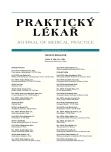-
Medical journals
- Career
Základy kognitivní, afektivní a sociální neurovědy
XXI. Emoce a kognitivní funkce
Authors: F. Koukolík
Authors‘ workplace: Primář: MUDr. František Koukolík, DrSc. ; Národní referenční laboratoř prionových chorob ; Thomayerova nemocnice, Praha ; Oddělení patologie a molekulární medicíny
Published in: Prakt. Lék. 2012; 92(7): 371-377
Category: Editorial
Overview
Cognition and emotion interact to determine ongoing behaviours. The paper describes:
- key nodes of connectomes of the human brain (large scale neuronal networks) which process interactions of neuronal events called emotions and cognition in folk psychology (e.g. amygdala, posterior cingular, retrosplenic and prefrontal cortex),
- some experiments focused on interaction of emotion and cognitive functioning (e.g. their interaction in construction of autobiographic memory, influence of anxiety on cognition, their development in aging, gender differences, influence on moral sensitivity) and
- the hypothesis of somatic markers.
Key words:
cognition, emotion, interaction, connectome, somatic markers hypothesis
Sources
1. Adolphs, R., Tranel, D., Denburg, N. Impaired emotional declarative memory following unilateral amygdala damage. Learn Mem 2000; 7, p. 180–186.
2. Anderson, A.K., Phelps, E.A. Lesions of the human amygdala impair enhanced perception of emotionally salient events. Nature 2001; 411, p. 305–308.
3. Bechara, A., Damasio, H., Damasio, A.R. Emotion, decision making and the orbitofrontal cortex. Cereb Cortex 2000; 10, p. 295–307.
4. Bechara, A., Tranel, D., Damasio, H. Characterization of the decision-making deficit of patients with ventromedial prefrontal cortex lesions. Brain 2000; 123, p. 2189–2202.
5. Bechara. A., Damasio, H., Damasio, A.R. Role of the amygdala in decision making. Ann NY Acad Sci USA 2003, 985, p. 356–359.
6. Canli, T., Desmond, J.E., Gabrieli, J.D.E., et al. Sex differences in the neural basis of emotional memories. Proc Natl Acad Sci USA 2002; 99, p. 10789–10794.
7. Cato, M.A., Crosson, B., Gökcay, D., et al. Processing words with emotional connotation: an fMRI study of time course and laterality in rostral frontal and retrosplenial cortices. J Cogn Neurosci 2004; 16, p. 167–177.
8. Decety, J., Michalska, K.J., Kinzler, K.D. The contribution of emotion and cognition to moral sensitivity: a neurodevelopmental study. Cereb Cortex 2012; 22: p. 209-220
9. Dolcos, F., LaBar, K.S., Cabezza, R. Interaction between the amygdala and the medial temporal lobe memory system predicts better memory for emotional events. Neuron 2004; 42, p. 855–863.
10. Hu, K., Bauer, A., Padmala, S. Threat of bodily harm has opposing effects on cognition. Emotion 2012; 12(1): p. 28–32.
11. Koukolík, F. Lidský mozek. Funkční systémy. Norma a poruchy. 3. vydání. Praha: Galén, 2012.
12. Lee, K.H., Siegle, G.J. Commons and distinct brain network underlying explicit emotional evaluation: a metaanalytic study. Soc Cogn Affect Neurosci 2012; 7(5): p. 521–534.
13. Maddock, R.J. The retrosplenial cortex and emotion: new insights from functional neuroimaging of the human brain. Trends Neurosci 1999; 22, p. 310–316.
14. McGaugh, J.L. The amygdala modulates the consolidation of memories of emotionally arousing experiences. Annu Rev Neurosci 2004; 27, p. 1–28.
15. Nashiro, K., Sakaki, M., Mather, M. Age differences in brain activity during emotion processing: reflections of age-related decline or increased emotion regulation? Gerontology, 2012; 58, p. 156–163.
16. Pessoa, L. On the relationship between cognition and emotion. Nat Rev Neurosci 2008; 9, p. 148–158.
17. Pessoa, L., Padmala, S., Kenzer, A., Bauer, A. Interaction between cognition and emotion during response inhibition. Emotion 2012; 12(1): p. 192–197.
18. Phelps, E.A. Human emotion and memory: interactions of the amygdala and hippocampal complex. Curr Opin Neurobiol 2004; 14, p. 198–202.
19. Piefke, M., Weiss, P.H., Zilles, K., et al. Differential remoteness and emotional tone modulate the neural correlates of autobiographical memory. Brain 2003; 126, p. 650–688.
20. Samson, A.C., Huber, O., Gros, J.J. Emotion regulation in Asperger’s syndrome and high-functioning autism. Emotion 2012 May 28. [Epub ahead of print]; doi: 10.1037/a0027975.
21. Schirmer, A., Kotz, S.A. ERP evidence for a sex-specific Strop effect in emotional speech. J Cogn Neurosci 2003; 15, p. 1135–1148.
22. Siebert, M., Markowitsch, H.J., Bartel, P. Amygdala, affect and cognition: evidence from 10 patients with Urbach-Wiethe disease. Brain 2003; 126, p. 2627–2637.
23. Yamasaki, H., LaBar, R.K., McCarthy, G. Dissociable prefrontal brain system for attention and emotion. Proc Natl Acad Sci USA 2002; 99, p. 11447–11451.
Labels
General practitioner for children and adolescents General practitioner for adults
Article was published inGeneral Practitioner

2012 Issue 7-
All articles in this issue
-
Základy kognitivní, afektivní a sociální neurovědy
XXI. Emoce a kognitivní funkce - Bradykinin-induced angioedema and its differential diagnosis
- First experience with undergraduate teaching of assessment medicine at medical faculties
- Narrative perspective in medicine
- Will we vaccinate against smoking?
- Evaluating the validity of select fall risk assessment tools in hospitalized elderly
- Comprehensive assessment of elderly in long-term care institutions
- Sublingual allergen immunotherapy – progress in the treatment of allergic rhinitis and conjunctivitis
- So called problem prone patients
- Gender differences in food preferences in adolescents - are they projected into consumption?
-
Základy kognitivní, afektivní a sociální neurovědy
- General Practitioner
- Journal archive
- Current issue
- Online only
- About the journal
Most read in this issue- Bradykinin-induced angioedema and its differential diagnosis
- Evaluating the validity of select fall risk assessment tools in hospitalized elderly
- Sublingual allergen immunotherapy – progress in the treatment of allergic rhinitis and conjunctivitis
- So called problem prone patients
Login#ADS_BOTTOM_SCRIPTS#Forgotten passwordEnter the email address that you registered with. We will send you instructions on how to set a new password.
- Career

